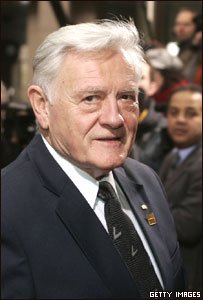Президент Литвы боится войны с Россией?
- 22 января 2008
 Президент Литвы опасается, что Россия начнет новую холодную войну
Президент Литвы опасается, что Россия начнет новую холодную войну
Так пишет российский портал «Utro.ru» со ссылкой на The Financial Times. Утверждается, что президент Литвы Валдас Адамкус заявил журналистам о своем подозрении, что Москва может начать "новую холодную войну" на фоне интенсивного развития российской экономики.
Адамкус отметил, цитирует The Financial Times «Utro.ru», что в последнее время внешняя политика Кремля становится все более жесткой, и примером тому служит конфликт с Британией, отразившийся на деятельности Британского совета на российской территории.
"Основным недостатком России является желание доминировать и диктовать свои условия", - заявил литовский лидер. По его словам, Литва старается поддерживать позитивные отношения со всеми государствами, однако у России она взаимности не встретила. Как сказал Адамкус, напомнив историю с переносом монумента "Бронзовый солдат", в отношениях с прибалтийскими республиками Москва "создает ненужное напряжение".
Приводим ниже оригинал статьи из The Financial Times:
Lithuanian leader in ‘cold war’ warning
By Stefan Wagstyl in London
Published: January 22 2008
Russia’s economic resurgence could be driving the Kremlin to embark on a new “cold war”, Valdas Adamkus, the Lithuanian president, has warned.
“The question comes up whether a very strong financial recovery in Russia is a stimulus for the new Russian leadership to return to the cold war,” said the veteran Lithuanian president in an interview with the Financial Times.
It’s a big question mark. I don’t believe that at the present time any of us, big or small – the European Union, the US or other big powers – definitely has the answer. But I believe the same big question is in everybody’s mind in the western world.”
Mr Adamkus was referring to signs of Russia’s growing assertiveness in its foreign policy, including the move to close two offices of the British Council, the UK cultural body, its sabre-rattling over energy supplies, and its repeated political and economic pressure on the Baltic states.
Mr Adamkus, who is 81, is a former US government official who returned to his native Lithuania in the 1990s, entered public life and is now serving his second term as president.
He said Lithuania was always open to building constructive ties with its big neighbour but there was little sign from Moscow of a willingness to co-operate. “The issue goes way back into history ... Nobody will deny that Russia is a big country, which wants to be heard and wants to have a big voice in world politics. We can accept all these desires that Russia has.
“The one big minus is that Russia wants to dominate and dictate. What the rest of the world in the 21st century is looking for is that Russia will become a constructive, democratic, active participant in creating a new society and building a better quality of life for all people,” he said.
The Kremlin was creating “unnecessary tensions” in the Baltic, said Mr Adamkus. He referred to conflicts with Latvia, followed last year by a dispute with Estonia over the relocation of a Soviet-era war memorial and to arguments between Moscow and Vilnius.
Lithuanian officials say they feel that they are being singled out by the Kremlin, following Vilnius’s decision in late 2006 to sell a controlling stake in its Mazeikiu oil refinery to Poland’s PKN Orlen and reject approaches from potential Russian buyers. Russia subsequently announced that the pipeline supplying Mazeikiu with Russian oil, which had earlier been closed for repairs, would not be reopened, forcing Mazeikiu to import expensive sea-borne crude.
Mr Adamkus argued that Lithuania must reduce its dependence on Russian energy by diversifying, and restated his strong support for a proposed new nuclear power station.

Комментарии (7)